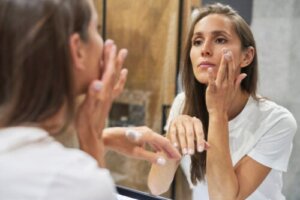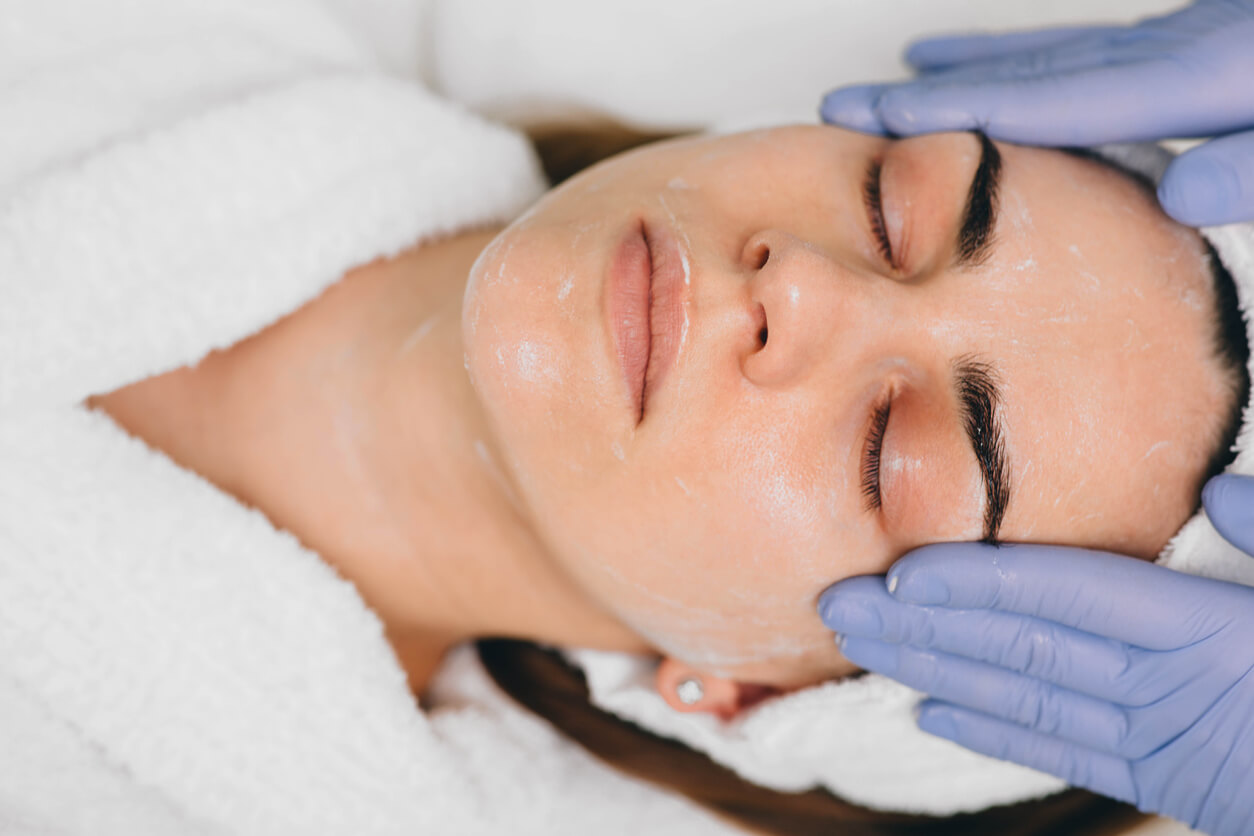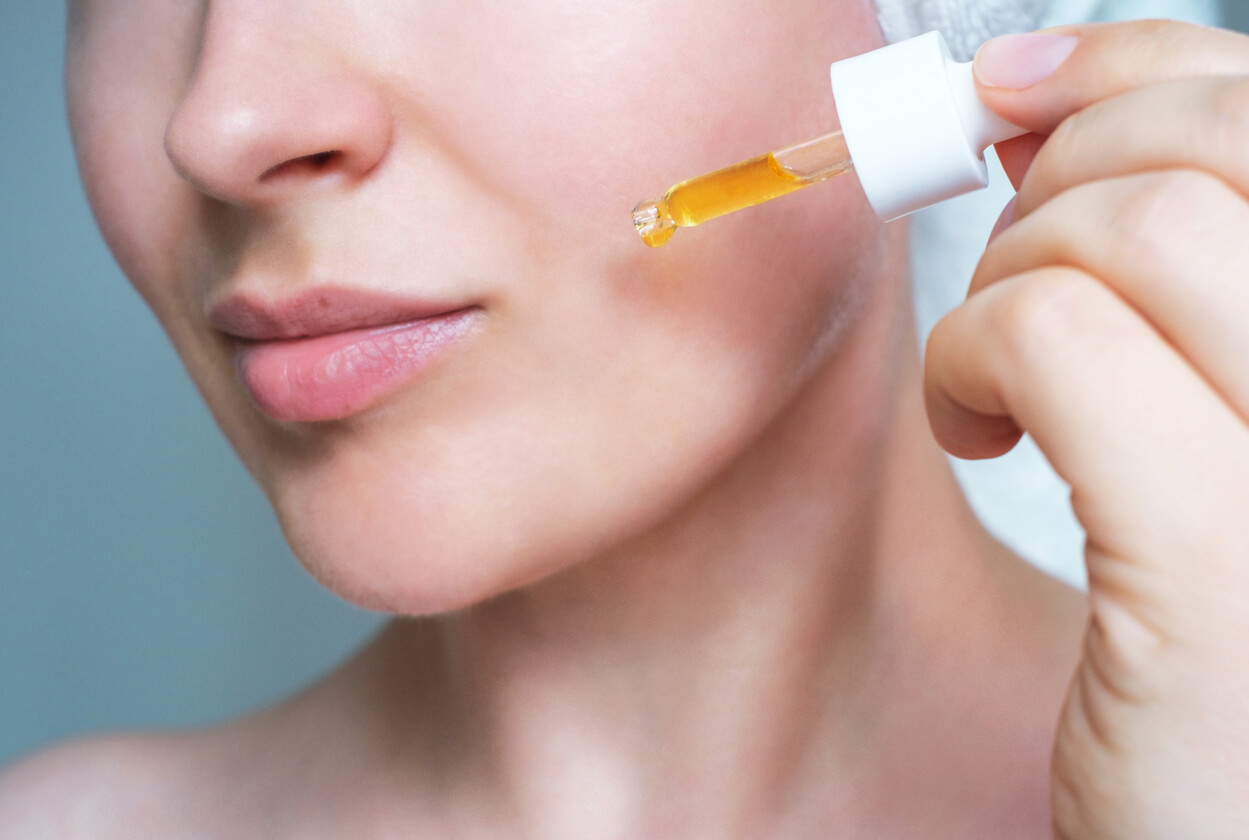The Best Care for Aging Skin


Written and verified by the dermatologist Maria del Carmen Hernandez
Maintaining the best care for aging skin helps to give it a more luminous and turgid appearance. Although it’s best to prevent and start early, once the skin is already aged, there are also routines you can follow.
Do you have a skincare routine that you practice every day? Here’s what to keep in mind to take care of your aging skin.
What’s aging skin?
As people’s skin ages, both the function and stability of its structure are lost. In addition to genetic factors, estrogen levels also influence the integrity of the skin’s surface in women.
The aging process affects the skin in different ways. For example, the epidermis (outermost layer) thins, and the rate of renewal of its component cells is dramatically reduced. This decrease in thickness is especially evident on the face, neck, upper chest, and the extensor surface of the hands and forearms.
Although the number of sweat glands doesn’t change, sebum production decreases by up to 60%. In addition, there’s a reduction in the natural emulsion of sebum and water in the skin, which is reduced by 65%.
You may be interested in: How Cold Affects the Skin
How to prevent premature aging
The drop in estrogen levels in middle age leads to premature aging compared to men of a similar age.
Aggressions from the outside also contribute to the aging process. Ultraviolet light, for example, can generate multiple alterations of cellular DNA and cause cumulative damage to the skin.
In addition, according to a publication in The Journal of Investigative Dermatology, other environmental aggressions in the form of cigarette smoke or pollution also accelerate the natural aging processes.

Chemical peels
Chemical peels with alpha hydroxy acids or trichloroacetic acid ablate the surface layers to induce smooth, even skin as a result of regeneration and repair mechanisms.
Botulinum toxin application
While botulinum toxin has no effect on skin texture, it can interrupt the aging process by helping to control dynamic facial lines and wrinkles.
Dosages for patients depend on the area, muscle mass, gender, and other individual factors. In addition, contraindications include peripheral motor neuropathic diseases or functional neuromuscular disorders.
The best daily habits for aging skin
The main source of any anti-aging therapy is to achieve smooth, healthy, translucent, flawless, and resilient skin.
Skin protection
Daily skin care can increase skin regeneration, smoothness, and elasticity. Chronic photodamage manifests itself as photoaging. Wrinkles and pigmentary changes are linked to premature photoaging and are considered its most relevant skin manifestations.
Strategies aimed at preventing photoaging include avoiding the sun and using sunscreen to block or decrease skin exposure to ultraviolet rays.
Topical creams
There are two types of components that can be used in anti-aging creams: Antioxidants and cell regulators. Therefore, antioxidants, such as vitamins and polyphenols, decrease collagen degradation.
Cell regulators, such as retinol, peptides, and growth factors, have direct effects on collagen metabolism and influence collagen production.

Platelet-rich plasma (PRP)
There’s evidence that PRP can induce the synthesis of collagen and other components that stimulate the activation of fibroblasts and thus rejuvenate the skin.
It’s not a procedure that should be performed every day, but rather every three months or so. In addition, you should always respect the use of sun protection on a daily basis.
Why is it so important to take care of your skin?
Skin that’s in good condition and properly cared for acts as a natural protective barrier against different aggressive external factors. Preventing the signs of aging is easier and less expensive than correcting them in the future.
One of the most important reasons to take care of the skin is to prevent cancerous lesions caused by exposure to ultraviolet rays. Therefore, it’s important to use sunscreen every day and constantly.
Care and aging skin
Although natural aging is determined by genetics, extrinsic aging can be prevented through certain habits.
Healthy aging includes healthy habits such as a varied diet, adequate fluid intake, the use of sunscreen every day, and anti-aging products. Also, exposure to the sun’s rays should be avoided.
Maintaining the best care for aging skin helps to give it a more luminous and turgid appearance. Although it’s best to prevent and start early, once the skin is already aged, there are also routines you can follow.
Do you have a skincare routine that you practice every day? Here’s what to keep in mind to take care of your aging skin.
What’s aging skin?
As people’s skin ages, both the function and stability of its structure are lost. In addition to genetic factors, estrogen levels also influence the integrity of the skin’s surface in women.
The aging process affects the skin in different ways. For example, the epidermis (outermost layer) thins, and the rate of renewal of its component cells is dramatically reduced. This decrease in thickness is especially evident on the face, neck, upper chest, and the extensor surface of the hands and forearms.
Although the number of sweat glands doesn’t change, sebum production decreases by up to 60%. In addition, there’s a reduction in the natural emulsion of sebum and water in the skin, which is reduced by 65%.
You may be interested in: How Cold Affects the Skin
How to prevent premature aging
The drop in estrogen levels in middle age leads to premature aging compared to men of a similar age.
Aggressions from the outside also contribute to the aging process. Ultraviolet light, for example, can generate multiple alterations of cellular DNA and cause cumulative damage to the skin.
In addition, according to a publication in The Journal of Investigative Dermatology, other environmental aggressions in the form of cigarette smoke or pollution also accelerate the natural aging processes.

Chemical peels
Chemical peels with alpha hydroxy acids or trichloroacetic acid ablate the surface layers to induce smooth, even skin as a result of regeneration and repair mechanisms.
Botulinum toxin application
While botulinum toxin has no effect on skin texture, it can interrupt the aging process by helping to control dynamic facial lines and wrinkles.
Dosages for patients depend on the area, muscle mass, gender, and other individual factors. In addition, contraindications include peripheral motor neuropathic diseases or functional neuromuscular disorders.
The best daily habits for aging skin
The main source of any anti-aging therapy is to achieve smooth, healthy, translucent, flawless, and resilient skin.
Skin protection
Daily skin care can increase skin regeneration, smoothness, and elasticity. Chronic photodamage manifests itself as photoaging. Wrinkles and pigmentary changes are linked to premature photoaging and are considered its most relevant skin manifestations.
Strategies aimed at preventing photoaging include avoiding the sun and using sunscreen to block or decrease skin exposure to ultraviolet rays.
Topical creams
There are two types of components that can be used in anti-aging creams: Antioxidants and cell regulators. Therefore, antioxidants, such as vitamins and polyphenols, decrease collagen degradation.
Cell regulators, such as retinol, peptides, and growth factors, have direct effects on collagen metabolism and influence collagen production.

Platelet-rich plasma (PRP)
There’s evidence that PRP can induce the synthesis of collagen and other components that stimulate the activation of fibroblasts and thus rejuvenate the skin.
It’s not a procedure that should be performed every day, but rather every three months or so. In addition, you should always respect the use of sun protection on a daily basis.
Why is it so important to take care of your skin?
Skin that’s in good condition and properly cared for acts as a natural protective barrier against different aggressive external factors. Preventing the signs of aging is easier and less expensive than correcting them in the future.
One of the most important reasons to take care of the skin is to prevent cancerous lesions caused by exposure to ultraviolet rays. Therefore, it’s important to use sunscreen every day and constantly.
Care and aging skin
Although natural aging is determined by genetics, extrinsic aging can be prevented through certain habits.
Healthy aging includes healthy habits such as a varied diet, adequate fluid intake, the use of sunscreen every day, and anti-aging products. Also, exposure to the sun’s rays should be avoided.
All cited sources were thoroughly reviewed by our team to ensure their quality, reliability, currency, and validity. The bibliography of this article was considered reliable and of academic or scientific accuracy.
- Vierkötter A, Schikowski T, Ranft U, Sugiri D, Matsui M, Krämer U, Krutmann J. Airborne particle exposure and extrinsic skin aging. J Invest Dermatol. 2010 Dec;130(12):2719-26. doi: 10.1038/jid.2010.204. Epub 2010 Jul 22. PMID: 20664556.
- Boss GR, Seegmiller JE. Age-related physiological changes and their clinical significance. West J Med. 1981 Dec;135(6):434-40. PMID: 7336713; PMCID: PMC1273316.
- Trautinger F. Mechanisms of photodamage of the skin and its functional consequences for skin ageing. Clin Exp Dermatol. 2001 Oct;26(7):573-7. doi: 10.1046/j.1365-2230.2001.00893.x. PMID: 11696060.
- Kim DH, Je YJ, Kim CD, Lee YH, Seo YJ, Lee JH, Lee Y. Can Platelet-rich Plasma Be Used for Skin Rejuvenation? Evaluation of Effects of Platelet-rich Plasma on Human Dermal Fibroblast. Ann Dermatol. 2011 Nov;23(4):424-31. doi: 10.5021/ad.2011.23.4.424. Epub 2011 Nov 3. PMID: 22148008; PMCID: PMC3229934.
- Dessy LA, Mazzocchi M, Rubino C, Mazzarello V, Spissu N, Scuderi N. An objective assessment of botulinum toxin A effect on superficial skin texture. Ann Plast Surg. 2007 May;58(5):469-73. doi: 10.1097/01.sap.0000244968.16977.1f. PMID: 17452827.
This text is provided for informational purposes only and does not replace consultation with a professional. If in doubt, consult your specialist.








